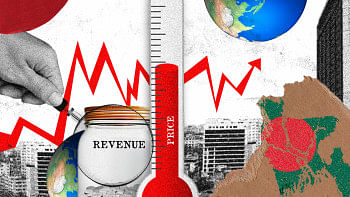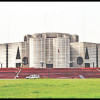Why our balance of payments won’t balance out post-election

With the facade of the elections at its height, prevailing financial issues seem to have faded into the background. While the mystery of how local politicians have made their fortunes is being speculated in every constituency, people seem less bothered about the nation's finances. But, contrary to what many believe, these issues will not iron themselves out after the election. Financial matters cannot be fixed overnight. They are the accumulation of past mistakes made in the banking sector and the capital market, which have strained our overall balance of payments.
During the first four months of the 2023-24 fiscal year (July-October), Bangladesh's balance of payments took a disturbing turn. Although the trade deficit came down to $3.8 billion, this was an orchestrated dip brought about by putting a hard brake on import growth, which suffered a decline of more than 20 percent while exports displayed only a 3.6-percent growth over the same period. The import of capital machinery witnessed an almost 36-percent drop during July-November 2023. This will invariably reduce future GDP growth, which the World Bank projects to be 5.6 percent in FY 2023-24—less than the finance ministry's prediction of 6.5 percent.
The deficits in services and primary income stood to be $1.7 billion and $1.35 billion, respectively, over the July-October 2023 period. This, added to the trade deficits, faces us with a total deficit of $6.86 billion. Secondary income, the majority of which is made up of remittances, stands as a positive figure of $7.1 billion, making the current account balance less than one-fourth of a billion dollars. The surprising and unprecedented deficits in the financial accounts put the overall balance of payments at a negative figure of $3.83 billion—almost equivalent to the trade deficits. And this yanked the foreign reserve down to $20.7 billion at the end of October 2023. The declining trend continued, with the reserve being at $19.5 billion at the end of November 2023. The balance of reserves has worsened since October last year, primarily due to an incorrect exchange rate policy and the failure to control trade mis-invoicing (which drains dollars via illicit capital flight overseas).
As previous patterns suggested, there will be an upsurge in both exports and imports after the national election on January 7. This idea is held more so due to imports since they have been kept suppressed for the last year or so. The majority of Bangladesh's imports consists of capital machinery, intermediate goods, and raw materials—the import of all of which has been intentionally deferred due to political turbulence. Thus, a 20-percent drop in imports is expected to reverse this trend after the election, when the pent-up import demand will be unleashed. Given the figures of exports and imports during the July-October 2023 period, annual exports over the remainder of FY 2023-24 are expected to remain in the vicinity of $52 billion while imports may reach $70 billion, making the trade deficit to be around $18 billion.
In the near future, the deficits in the balance of services and primary income are expected to reach $9 billion, making the total deficit to be around $27 billion (which will largely be offset by probable remittances of $22 billion). Hence, the current account balance can expect an approximately $5 billion deficit at the end of the ongoing fiscal year. The balance of the financial account, including foreign investments in the country, is the ultimate determinant of Bangladesh's balance of payments. If the current trend continues, the financial account will end up in a deficit of around $12 billion, given that it was at around $4 billion during the first four months of FY 2023-24. However, proportional calculations do not work for a financial account because its main incentive belongs to a lucrative rate of return in a macroeconomically stable environment.
Because of not-so-thorough policies and inadequate rates of return in Bangladesh, whether foreign investment will again gravitate to our economy is difficult to conjecture. A deficit of $6 billion to $10 billion may remain in the financial account, making the overall balance in the balance of payments close to negative $10 billion—a figure which will push foreign currency reserves below $10 billion, footing imports for a little under two months. Needless to say, this would be an alarming situation in terms of macro stability.
But there are ways to address this impending crisis, by promoting exports, controlling imports, increasing remittance inflow, and increasing the financial balance. Export growth mainly depends on foreigners' income growth and the taka's devaluation. While Bangladesh has no influence on foreigners' income growth or their preference for our goods, a devaluation of the taka will promote exports, slow the pace of import growth, and invite higher remittances through the official channels. The treatment of the financial balance is the most critical action in managing the balance of payments. But the return of Bangladeshi bonds and other securities must be competitively attractive to foreigners. Our slow pace of upward interest rate adjustments is what has primarily damaged the financial markets.
Simply put, policy tardiness in terms of interest rates and exchange rates is responsible for the financial issues that Bangladesh is facing now. Our fate would have been the opposite of what it is now, had policymakers at the finance ministry and the central bank acted wisely by not opting for makeshift theories which contradict logical macroeconomic policymaking. As we have learned in theory, the balance of payments will always balance, and this can be true for Bangladesh as well. But it will happen at the cost of a funding hemorrhage in foreign reserves. And this is not desirable at the current stage of the country's development journey. The situation warrants the presence of stronger leadership at all financial institutions—where leaders will make timely decisions regarding policies which make sense in economics, and not just ensure temporary political gains for the powers that be.
Calculations for predictions are the author's own.
Dr Birupaksha Paul is professor of economics at the State University of New York at Cortland in the US.
Views expressed in the article are the author's own.
Follow The Daily Star Opinion on Facebook for the latest opinions, commentaries and analyses by experts and professionals. To contribute your article or letter to The Daily Star Opinion, see our guidelines for submission.

 For all latest news, follow The Daily Star's Google News channel.
For all latest news, follow The Daily Star's Google News channel. 










Comments